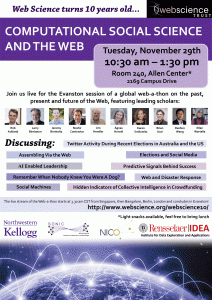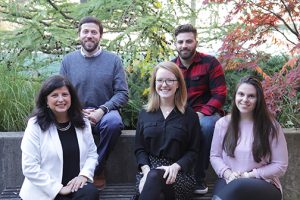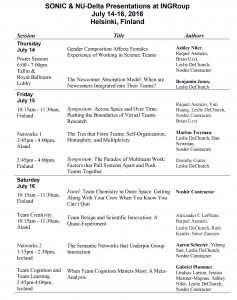Please join us in celebrating the 10th birthday of Web Science at Northwestern University – the final stop of a 10-hour web-a-thon that will have spanned the globe from Singapore, Bangalore, Berlin, and London before landing in Evanston.

Please join us in celebrating the 10th birthday of Web Science at Northwestern University – the final stop of a 10-hour web-a-thon that will have spanned the globe from Singapore, Bangalore, Berlin, and London before landing in Evanston.

Congratulations to Alina, who received the Northwestern University School of Communication 2016 Graduate Dissertation award, granted annually by the department.
The title of her dissertation is “Assembly Mechanisms of Interdisciplinary Scientific Teams and Their Impact on Performance”.
SONIC is currently hosting the ATLAS team within its lab space.
 ATLAS (Advancing Teams, Leaders, and Systems) is the group formerly known as DELTA (Developing Effective Leaders, Teams, and Alliances) – expats from Georgia Tech, headed by their director Leslie DeChurch, who transferred to the Northwestern University this fall. Four students followed Leslie DeChurch: Lindsay Larson, Ashley Niler, Gabe Plummer, and Ilya Gokhman.
ATLAS (Advancing Teams, Leaders, and Systems) is the group formerly known as DELTA (Developing Effective Leaders, Teams, and Alliances) – expats from Georgia Tech, headed by their director Leslie DeChurch, who transferred to the Northwestern University this fall. Four students followed Leslie DeChurch: Lindsay Larson, Ashley Niler, Gabe Plummer, and Ilya Gokhman.
ATLAS are waiting for their lab space to be built out and equipped in time for the Winter Quarter. In the meantime, we are all enjoying the very close collaboration on our joint projects.
SONIC is co-sponsoring the 2016 Organizational Communication Mini-Conference (OCMC), hosted by the Department of Communication Studies at Northwestern University, Evanston, IL.
http://ocmc2016.soc.northwestern.edu
SONIC PhD student Marlon Twyman is a member of the conference’s planning committee. He will also present a paper “Networks of Computer-Mediated Team Assembly.” Aaron Schecter, a PhD candidate, is also presenting at this conference on “Bridging the Boundary While Minding the Seams: Team Boundary Propensities in Multiteam Systems.”
The purpose of the OCMC is to feature and support graduate students pursuing research about organizational communication. The two-day event provides burgeoning scholars in the field with the opportunity to present their dissertations or other research projects, receive feedback, and socialize with their peers and with established faculty. The informal atmosphere of the OCMC is also well suited for students who wish to present and receive constructive criticism on early dissertation plans.
On September 9, 2016 Noshir Contractor presented at the Department of Computer Science and Automation Seminar Series at the Indian Institute of Science in Bangalore, India. He spoke on the topic of Leveraging Computational Social Science to Address Grand Societal Challenges.
Congratulations to a SONIC graduate student Marlon Twyman who received a Runner-up: “Best Student Paper” Award at the INGRoup 2016 conference for this presentation:
Marlon Twyman, Dan Newman, Leslie DeChurch, and Noshir Contractor. The Ties that Form Teams: Self-Organization, Homophily, and Multiplexity. 11th Annual INGRoup Conference, Helsinki, Finland , July 14-16, 2016.
Abstract:
This paper explains the unfolding process of team assembly – the behaviors involved as individuals consider and form relationships with potential teammates. We explore the role of self-organizing principles, homophily, and multiplexity in explaining how individuals choose their collaborators. Findings reveal multiplexity is a stronger predictor of team assembly than homophily.
SONIC and NU-Delta members presented at the INGRoup conference on July 14-16 in Helsinki, Finland.
Abstracts for posters and presentations are listed below the schedule.

Gender Composition Affects Females Experience of Working in Science Teams
Ashley Niler, Raquel Asencio, Leslie DeChurch, Brian Uzzi, Noshir Contractor
Success in scientific fields hinges on effective collaboration. Whereas females excel in communal settings, they are underrepresented in scientific fields, and on science teams. We find the percentage of females on a team affects females’ level of team identification and collective efficacy, and subsequently team performance.
The Newcomer Absorption Model: When are Newcomers Integrated into Their Teams?
Benjamin Jones, Leslie DeChurch
This study explores newcomer absorption in teams from the perspective of the incumbents, and how they adapt to the newcomer’s addition to the team. Findings support the idea that incumbent identity strength and the identity threat posed by the newcomer jointly undermine newcomer absorption.
Symposium: Across Space and Over Time: Pushing the Boundaries of Virtual Teams Research
Raquel Asencio, Yun Huang, Leslie DeChurch, Noshir Contractor, Brian Uzzi
Globalization and advancements in communication technology have encouraged the use of virtual teams; however, our knowledge of the dynamics and the implications of working across geographic, organizational, and time boundaries remains limited. Our symposium pushes the boundaries of research on virtual teams by exploring new topics and utilizing different methods.
The Ties that Form Teams: Self-Organization, Homophily, and Multiplexity
Marlon Twyman, Leslie DeChurch, Dan Newman, Noshir Contractor
This paper explains the unfolding process of team assembly – the behaviors involved as individuals consider and form relationships with potential teammates. We explore the role of self-organizing principles, homophily, and multiplexity in explaining how individuals choose their collaborators. Findings reveal multiplexity is a stronger predictor of team assembly than homophily.
Symposium: The Paradox of Multiteam Work: Factors that Pull Systems Apart and Push Teams Together
Dorothy Carter, Leslie DeChurch
Multiteam systems present a paradox of building strong component teams that function effectively as a larger system. This symposium examines factors pulling these systems apart and pushing component teams together. The papers take important next steps in advancing MTS research to new levels of theoretical precision and into new contexts.
Panel: Team Chemistry in Outer Space: Getting Along With Your Crew When You Know You Can’t Quit
Noshir Contractor
One of the riskiest group projects in history is being planned – a manned trip to Mars. This panel focuses on the composition of teams selected for long-duration space missions. It will consider what groups research across multiple disciplines can tell us about high performing teams in space missions
Team Design and Scientific Innovation: A Quasi-Experiment
Alexander C LoPilato, Raquel Asencio, Leslie DeChurch, Ruth Kanfer, Steve Zaccaro
There are two important realities of innovation, and together, they present a formidable paradox: innovation happens in teams, and various flavors of diversity have been shown to hinder team functioning. We manipulate team design to compare integration and innovation in two structures: a cross-functional team and an interdisciplinary multiteam system.
The Semantic Networks that Underpin Group Interaction
Aaron Schecter, Yiheng Sun, Leslie DeChurch, Noshir Contractor
Semantic network analysis combined with content and sentiment analysis affords new insights into the nature of group interaction. We illustrate the value of semantic network analysis as a small group research tool. For example, we find group members match one another’s social, analytic, and informational communication, but not the emotionality.
When Team Cognition Matters Most: A Meta-Analysis
Gabriel Plummer, Lindsay Larson, Jessica Mesmer-Magnus, Ashley Niler, Leslie DeChurch, Noshir Contractor
We uncover the operating conditions under which cognition is most critical to team success. Five key factors affect the instrumentality of team cognition to team affect, behavioral process, performance, and viability. These factors can be categorized as: team identity reinforcers, team stressors, team motivators, team sociomateriality, and team external embeddedness.
Noshir Contractor gave a keynote address at the 2016 annual Web Science Summer School held in Koblenz, Germany. Click here for the event page and click here to download slides from the presentation.
Abstract:
The increased access to big data about social phenomena in general, and network data in particular, has been a windfall for social scientists. But these exciting opportunities must be accompanied with careful reflection on how big data can motivate new theories and methods. Using examples of his research, Contractor will argue that Web/Internet/Network Sciences (WINS) serve as the foundation to unleash the intellectual insights locked in big data. More importantly, he will illustrate how these insights offer social scientists an unprecedented opportunity to engage more actively in monitoring, anticipating and designing interventions to address grand societal challenges.
Northwestern University hosted a one-day workshop for all faculty and students who participated in the 3-university graduate seminar that was co-taught with University of Pennsylvania and Wisconsin during the winter and spring quarter. This workshop took place on June 22, 2016.
SONIC is proud to co-organize the 2nd International conference on Computational Social Science by the Kellogg School of Management, Northwestern University.
IC2S2 event attendees are granted the option to select to participate in one of our Pre-Sessions, participating in either the Datathon on June 22-23, or the Skills Workshops on June 24.
IC2S2 2016 is the combination of two inaugural computational science conferences, the Computational Social Science Summit (last held May 15-17, 2015 in Evanston, Ill.) and the International Conference on Computational Social Science (last held June 8-11, 2015 in Helsinki, Finland).
Find additional information about the event by clicking here.
